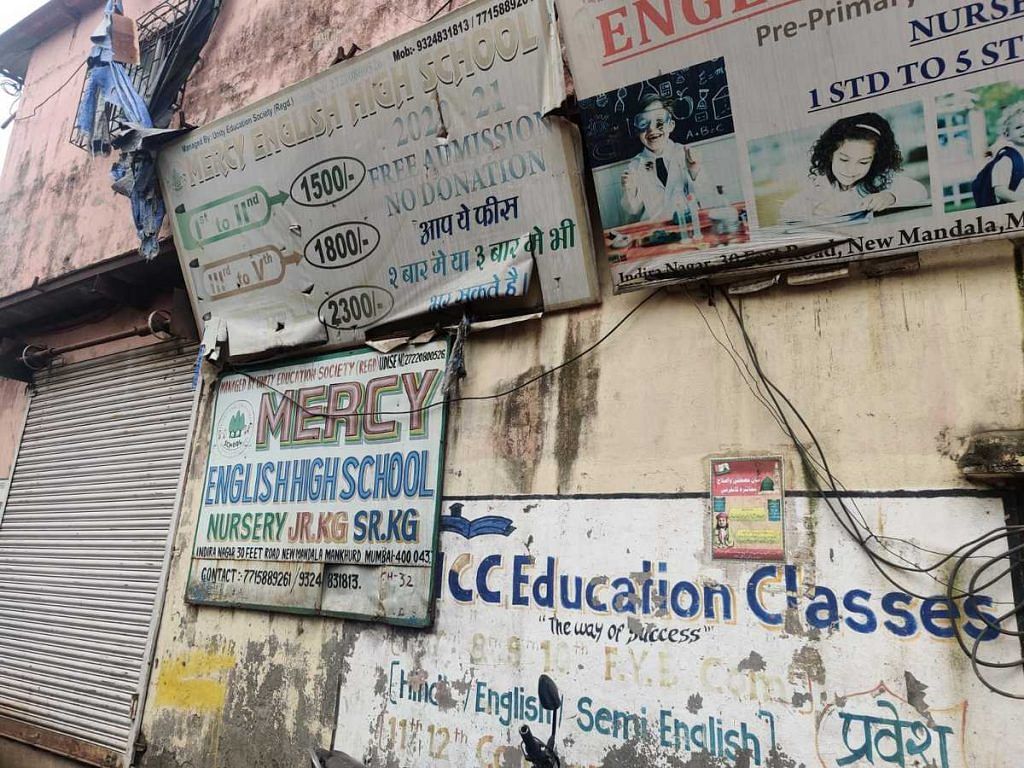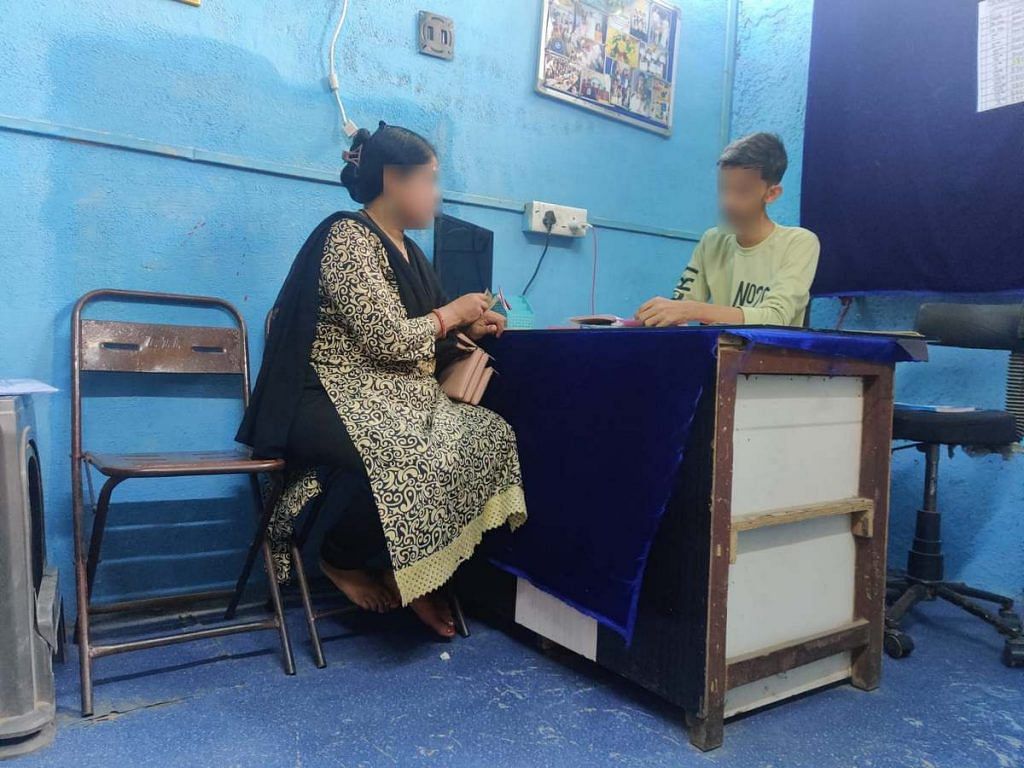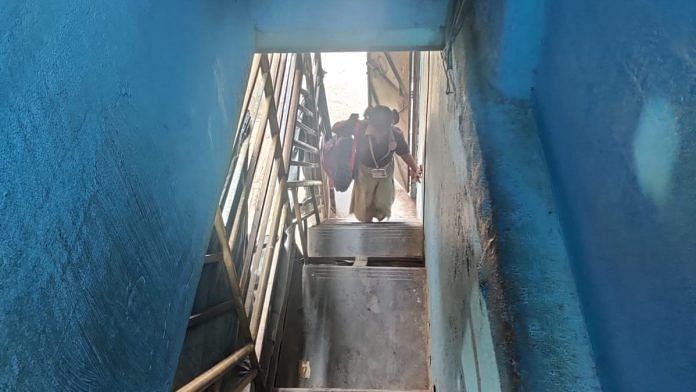Mumbai: For the 200-250 students of a small school located in Mumbai’s suburban Mankhurd area, getting to class means walking down a narrow corridor and then climbing up a rickety iron ladder. The classroom itself is a small, unventilated space where 30 uniformed children sit crammed together. The asbestos sheet roof keeps the room hot, and even the fans simply push around warm air.
A tiny office space separates this class from an identical room, where another 30 children try to learn in the stifling atmosphere.
That this school is holding classes at all is surprising given that the Maharashtra government and the city’s civic body, the Brihanmumbai Municipal Corporation (BMC), have deemed it as “unrecognised” and, therefore, not permitted to operate.
Every year, the state education department takes out a list of “unrecognised” schools, which means that they do not have a license or authority by the government to function. Most of them do not meet minimum standards for safe infrastructure, classroom size, student to teacher ratio, and so on.
This January, the department released a government resolution, which ThePrint has seen, stating that in 2020-21, 674 schools across Maharashtra were categorised as unauthorised to operate.
Mumbai has the highest concentration of such schools — 239, with a capacity of about 5,000 students altogether — followed by Thane (149) and Palghar (143).
“We collect the data on the UDISE [Unified District Information System for Education, a central government-run database for schools] website. But after that we ask our district-level officers to check on these schools to see whether they really are unrecognised. Once they confirm, only then we prepare a final list,” an official from the state education department told ThePrint.
“We then send out ads in the newspapers to let parents know about these schools so that they can avoid taking admission in these. If the schools are still running, as per RTE [Right to Education Act], they are given a penalty of Rs 1 lakh,” the official added.
In the case of Mumbai, the BMC provides data about schools to the state government. Notably, some of the schools that featured in the BMC’s list from last year appeared again in the state government’s round-up.
When ThePrint visited Mankhurd in Mumbai’s Shivaji Nagar area, it found at least 10 schools from the “unrecognised” list functioning. All were in pitiable condition, with minimal classroom infrastructure, but were still in demand due to their low fees and proximity to low-income areas.
The management of some of these schools, however, claimed that they had applied for recognition but that the process was slow, and that they were providing education to underserved communities.
Speaking to ThePrint, BMC education department official Raju Tadvi said notices would be sent and action taken soon. “We can’t just close down these schools in the middle of the academic year because it involves around 5,000 kids and their future. However, we will start penalising these schools now,” he said.
Also read: A day in the life of primary school students in Gujarat, as shorthanded teachers multitask
Unqualified teachers, poor learning outcomes
Most of the unrecognised private schools listed for Mumbai are located in densely-populated slum areas. Their main attraction for parents is their low fees and the fact that they are closer to home than the nearest government schools.
“Children who study in these private schools have parents who are daily wage earners and do not have the money to pay the fees of good schools,” said Umar Sheikh who runs a local NGO in the Mankhurd area and holds community classes for school dropouts and other underprivileged children.
Most of the teachers who teach at these schools don’t have B.Ed degrees or formal training, Sheikh added, leading to poor learning outcomes for the students.

“An 8th standard student would not understand even a 5th standard math problem and we have to teach them all of it again,” Sheikh said.
ThePrint spoke to some of the teachers in these schools and found that most were unqualified to educate children.
One such teacher was a 23-year-old man who had just completed a course in hotel management. Speaking on condition of anonymity, he admitted he did not have a teaching degree or experience but had taken up the job to “earn back the money” he spent on his hotel management degree.
He teaches English, history, and geography to students of classes 7 to 10 for a paltry salary of Rs 6,000 per month.
Another teacher, who left her job recently after her monthly salary of Rs 5,000 was not hiked after a year, said she was in 11th standard herself when she started teaching. She took classes for standard 1.
She acknowledged that ‘unrecognised’ schools, like the one she worked for, set up students for failure later.
“If these students want to go for higher education, they will not get admission anywhere because the school is not recognised,” she said.
In “exams”, the teachers themselves set the paper and score students, this teacher said. “They are not affiliated to the government so students are promoted to higher standards solely based on the marks that the teacher gives them in their own set exams.”
‘At least the fees are manageable’
Parents in the community who spoke to ThePrint requested anonymity, fearing backlash.
Many said that they were not aware of whether their children’s schools were recognised by the state government or not, but instead prioritised factors like distance and cost.
“We don’t know [if the school is recognised], but fees are manageable at about Rs 300 per month. That’s why we sent our kids to these schools that are within 300 metres of our home,” said a parent of three children, of whom two study in an ‘unrecognised’ school and one in a government school.

“What do we do? There’s no government school nearby…. One is at Deonar, but it’s about 3-4 km from here. How do we take our kids so far?” said a mother whose three children, aged 7,9, and 11, study in one of the recognised schools on the government’s list. Her husband is a carpenter and earns on a per day basis.
Many parents, who are themselves uneducated, accept that they have little information about how their kids are faring in school.
A mother, whose husband runs a food stall in the area, said parent-teacher meetings were never conducted. “They should talk to us and tell us what is going on. I do not know if they are able to understand anything or not,” she said.
What does it take for a school to be recognised?
According to the state education department official quoted earlier, a new school must meet the requirements of the Maharashtra Self-Financed Schools (Establishment and Regulation) Act, 2012, in order to be recognised.
This includes setting up a society or trust for the school and then providing a registration certificate for it, as well as a copy of the memorandum of association or trust deed/scheme. A bank statement, an audit report of the last three years, land documents, and a “blueprint of the school plan” are also necessary, the official said.
School plan details include the number and size of classrooms, the provision of separate toilets for boys and girls, drinking water facilities, computers, and playground, among other things, according to the application form.
The management of some of these schools, asking that only their first names be used, claimed that they had submitted applications but complained the process was too slow and onerous.
Shekha, who is a member of the management of the unrecognised Mercy English School, said that the application has been submitted, but is taking time to be processed.
“Whenever we apply for any government-related thing, there is a long process. In our case, we have the UDISE number but the process is taking a long time. We have submitted the documents, but have not received any response as of now,” she claimed. The school has been functioning since 2016.
Nazm from Little Angel English School told ThePrint that they have received recognition for their secondary section, but it is pending for the primary wing. He grumbled that some of the requirements were difficult to meet.
“I need to have Rs 12-15 lakh in the account for fixed deposit. How will I have it? We run a school for poor people. Those with a lot of money like builders and politicians can easily open schools and get recognition, but we have to pay the government fees as well,” he said. His school has been running since 2003.
‘Will take action by December’
After the state government puts out its list of unrecognised schools, it is up to the district officers (or BMC in the case of Mumbai) to take necessary action, government officials say.
When asked about this, BMC education department official Raju Tadvi told ThePrint that the civic body is taking the matter seriously and will take action according to the provisions of the RTE by December.
“They will either have the option of taking recognition from the government of Maharashtra or BMC or close themselves down,” Tadvi said.
When asked about certain schools in slum areas that seem to be operating under particularly unsafe conditions, Tadvi said that schools that do not have proper infrastructure will not get any recognition. “We will take action against such schools,” he said.
(Edited by Asavari Singh)
Also read: Delhi catches up with online education craze, launches first-of-its-kind virtual school



